You peruse your bookshelves1, looking for something to read, when a thought occurs to you. You’ve read many books with third person perspective. Indeed, that seems to be the standard. First person narratives abound as well2, particularly in detective-adjacent stories. But what about second person? Wouldn’t it be easier to identify with the protagonist if the text suggested that the reader is the protagonist?
Writers must disagree, for there are relatively few examples. However, with some thought, you come up with five, that most perfect number of examples3. However, one of them suggests a bold narrative structure that will almost certainly break the Reactor website. The prospect of weeping web admins is too delightful to resist. Setting that example aside for now, you settle for four…
Well, why not? Readers are unlikely to notice unless you draw attention to that detail, and you can always remove any such admission before sending off the file. While you did intend to remind yourself not to highlight your deviation in this matter, you are distracted by a rabbit outside the dining room window. You never write the note. It is a very adorable rabbit.
You Will Go to the Moon by Mae and Ira M. Freeman (1959)
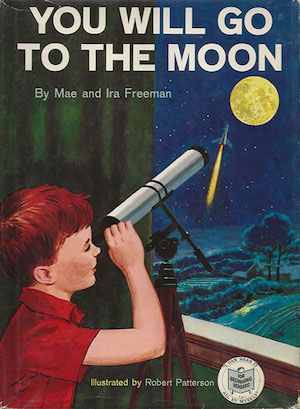
You remember fondly this children’s classic of space exploration, almost as old as NASA itself. Aimed at young readers, it delivered its essential space travel concepts to you in vocabulary appropriate for first graders, with illustrations on each page to further entice its target market. Given how often you reread it as a child, the design succeeded in its purpose.
Turning the pages, you consider what aspects of a lunar trip the Freemans got right—the need for a multistage rocket—and how many of the details did not play out as envisioned in the 1950s. In particular, rotating space stations are an as-yet unrealized potential4.
Still, you are bothered by the possibility that this book is not quite true second person. The phrasing suggests an adult is relating the events to come to a child before dispatching it into the icy depths of endless space, never to return. Are there better examples?
The Raven Tower by Ann Leckie (2019)
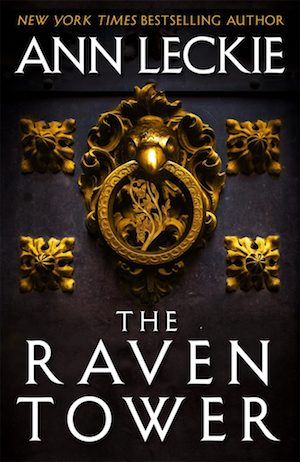
The Strength and Patience of the Hill is a god, old enough to remember trilobites. Despite this vast perspective, it chooses to focus on a small, very recent series of events. These involve power politics amongst the bipedal primates who recently evolved, their effect on Mawat, and Mawat’s friend Eolo.
Mawat, a prince of his people, believes that his father was murdered so that his uncle could take power. In fact, while Mawat’s uncle is indeed a miscreant, the crimes being committed are far more ominous than a simple assassination. Mawat’s misapprehension and the actions he takes as a consequence have divine implications. Tragedy for some, but not for The Strength and Patience of the Hill.
Have you ever provided a list of Hamlet-influenced works, you wonder? This question is a welcome distraction from the cold fact that this example too is not quite what you had in mind. Some sections of the narrative are second person, but others are first. Clearly Leckie did not consider your current needs.
Harrow the Ninth by Tamsyn Muir (2019)
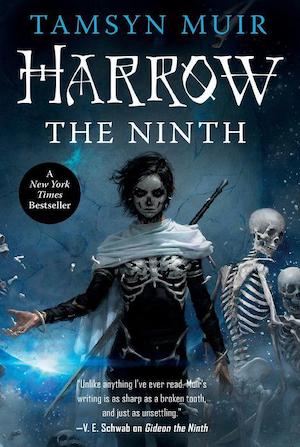
You discover that having entertained readers with a snarky, straightforward first person account in Gideon the Ninth, Muir shifts her perspective to Harrowhark “Harrow” Nonagesimus and her preferred tense to second in the sequel. Harrow ascended to the status of Lyctor at great cost to Gideon. You are not surprised to discover that surprises await…or why would there be a sequel?
In fact, a glorious assortment of surprises awaits both Harrow and you, as Harrow’s recollection of events is both incomplete and hard to reconcile with the first volume. Clearly, the author is working towards a goal visible to her, but initially not to the reader. Confused but intrigued, you persist.
In what is becoming a recurring pattern, you notice that this example too does not quite fit the remit. Harrow the Ninth is not entirely second person. Some portions are third person. You consider whether you should have researched more diligently, rather than acting in your usual haste. You are comforted by your conclusion that fault must lie with either Senator Proxmire or the Thor Power Tool Decision, as they are the sources of all evil in the world according to top SF pundits. Onward!
Halting State by Charles Stross (2007)
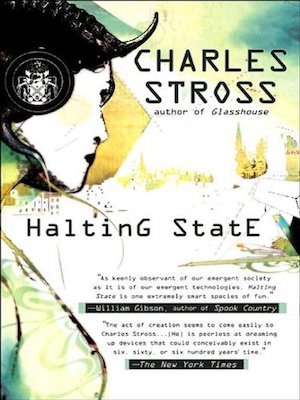
The narrative draws your attention to three protagonists, police person Sergeant Sue Smith, programmer Jack Reed, and forensic accountant insurance fraud investigator Elaine Barnaby. The tale cycles through each protagonist’s perspective.
At the center of the plot is Hayek Associates, a company that is the victim of a cybercrime. Ideally, crimes should be straightforward to resolve. This one is not. This is unfortunate, as the stakes are far higher than is at first apparent.
You note the care that Stross takes to make each perspective easily distinguished from the others, and the determination with which he stuck to second person. You also dwell upon on how swiftly and comprehensively actual near-future history diverged from Stross’ speculations. How sunnily optimistic SF authors were, nearly twenty years ago. Nevertheless, Halting State is exactly what you had in mind when you began, and you type the final period with satisfaction.
Could you round out the numbers to five by discussing Rule 34, Halting State’s sequel? You would have to mention two works by the same author in one essay not specifically devoted to that author. This feels like cheating. You set Rule 34 aside for an essay about novels set in the 2020s. You feel smug that in the course of writing this essay, you thought of ideas for three more. You prudently decline to consider how few of your idea seeds eventually become finished essays.
You realize that this leaves the matter of comments. Readers being so many and so widely read, no doubt they will immediately think of the examples you might have mentioned5. Best to admit personal flaws and await illumination.
Will commenters frame their comments in the standard format or will they use second person? You conclude there is no way to find out except to wait and see.
- The shelves of your own library or those of your public library? You decline to clarify.
- Always raising the question: to whom the narratives are addressed?
- For reasons you do not care to explain at this juncture. After all, why would you need to explain your own choices to yourself?
- On reflection, you muse on the lost opportunity presented by focusing on adult astronauts, rather than child astronauts. More children than adults can be crammed into a given mass of payload and in the days of the Baby Boom, children were plentiful and easily replaced. You wonder where your copy of Rocket Girls is. It too features a bold solution to the question of payload.
- In some cases, works you did mention.










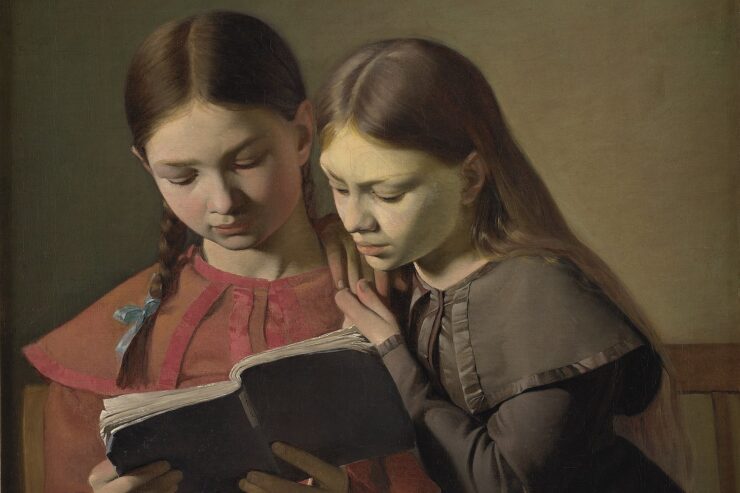
You’re shocked to find that this list doesn’t include Simon Jimenez’s The Spear Cuts Through Water which is written in first, second, and third person.
You realize that this is because The Spear That Cuts Through Water is in Mt Tsundoku.
You agree with JDN, since it is sitting on YOUR TBD, as well.
N. K. Jemisin’s Broken Earth trilogy could easily make this list. I presume that it’s not here because it’s been covered in another article?
It took me awhile in the broken Earth trilogy to realize that it was perspective which told me which character I was reading about. When I saw the title of this article, that was first book that I thought of.
Same here – though only one of the threads is told in the second person. At the end of the trilogy, you learn the reason , and it is an entirely reasonable one. Still felt kinda jarring, given the reason wasn’t exposed until near the end of the trilogy. It certainly is a notable example, though, and the first one I thought of as well.
You go to https://archive.org/details/boblemanfeestersinthelake/page/n291/mode/2up and read Instructions there. You wonder if short stories should be counted, but frankly you have bigger problems right now.
You have probably not read Adrian Tchaikovsky’s Ogres, which is entirely in the second person save for an epilogue in which it is revealed who thr narrator has been the whole time. You’re cast in the role of a village boy in a land ruled by an aristocracy of cannibal ogres, who fights back against them, goes on the run, and ultimately learns a great deal of history that has been concealed from the peasantry. If you were a better person, it might have ended differently.
You regret not including the Choose Your Own Adventure book series –especially because this is a dead-end branch of the story tree.
Turn to page 36 for horrifying death outcome 1. Turn to page 237 for horrifying death outcome number 2.
You enthusiastically second the comment you read from Kovert regarding the CYOA series, thanking Edward Packard, R.A. Montgomery, and other CYOA authors for having been a tremendous influence on your lifelong love of reading (and, no doubt, excessively anxious dread about unhappy endings).
You recall having tried If On a Winter’s Night a Traveller on the basis of the recommendation by a friend. You found it impenetrable because it kept telling you how you felt, when in fact your feelings are (or would be, under the circumstances) very different. For example, it told you how much you enjoyed riding a horse, an activity you had had several very bad experiences with. It is one of the few books that you have discarded unfinished.
Fortunately, you later realize that this is one of the great opportunities provided by second-person narratives — to imagine yourself as other than you are, perhaps in a more visceral sort of imagining than you would in a more standard story. You return to If On a Winter’s Night a Traveler, and are pleased to find a brilliant, perplexing, and funny work. Best of all, you didn’t really have to revise your feelings about real-life horseback riding.
You are reminded by this exchange that your copy of this book, which you began and then put aside, is still in your bedside bookshelf and perhaps you should dig it out and have another bash at it.
You had briefly recalled Orson Scott Card’s Hart’s Hope, until you remembered that the framing story is in the second person, but most of the body of the text is third person. (And the stupid ending poisons everything before it.) Still, you did note it for a possible article on “Five Books with the Most Unlikely Authors” or “Five Authors Who Did a U-Turn” or something like that.
Most (all?) interactive fiction (e.g. Zork) is second person. I don’t think I’d enjoy reading a second person book, though – I don’t want it to tell me that I’ve done something unless I’ve actually chosen to do the thing. Except for a choose-your-own-adventure book, as someone else pointed out – it’s both a book and interactive fiction.
You mention Keith Roberts’ “Molly Zero”, just because…
You are reminded of a zombie comic book you once read while at a tender age, but you did not retain either the issue name or the story name. But it was definitely in second person, where the second person was the human who woke up as a zombie (voodoo variety, not a post-Romero science zombie).
You find that the commentator has a strong antipathy to the use of the second-person viewpoint, as it feels as if the book is giving you orders, not relating a story. Despite this antipathy, you survived reading Harrow the Ninth, mostly because Tamsyn Muir’s story and writing were sufficiently interesting.
————————-
Reverting the the first person, and no longer telling Mr Nicoll what he is thinking, Writing in the second person strikes me as more an exercise in literary braggadocio than a useful point of view.
You remember being introduced to this technique by Brian Aldiss, in his novelette “Visiting Amoeba” in the collection The Canopy of Time. You recall that you found it distinctly annoying at the time. You note, with hindsight, that Aldiss was something of an experimenter in the prose field, and you further opine that some experiments are successful, while others just make a big stink.
You have since read both the Broken Earth trilogy and Harrow the Ninth, and you are inclined to cut the authors some slack in these cases, since it turns out there are genuine reasons for using the second person in these books. You are inclined to agree with the commenter SwampYankee, though, that in general it feels intrusive and hectoring, as if the book is telling you what to think about it.
You then decide to go to bed, but you find that you are in a maze of twisty little passages, all alike.
After the first reading, you genuinely did not remember that Harrow the Ninth was ostensibly in second person, because you had An Idea about that viewpoint from page one, and spent many chapters searching for a first person pronoun that could be attributed to a narrator, since the narrative voice was so vivid and somehow familiar. It took someone on Reddit complaining about the second-person perspective for you to go “Wait, what?” and re-read the book.
You find yourself wondering why Reactormag.com seems unwilling to accept a pithy comment you just wrote. You decide to open James’s essay in another tab and try posting another comment from there.
You reflect that James Sallis’ “Jim and Mary G” is a short story and not a book, but decide to mention it anyway.
You realize that, like many readers, you were so taken by the strength of Gideon’s “voice” in the book that you have forgotten that Gideon the Ninth was told in third person.
You wonder if a certain author will comment on their inclusion in this, the second time writing in the second person has been written about on this website currently in its second incarnation.
You recall many short stories in the 2nd person, such as “Instructions” by Bob Leman and “Don’t Look Behind You.”
(In a separate genre, you can’t help recalling the Beatles wrote a song in the second person, “For No One”)
You try desperately to think of something, anything written in second-person. Maybe the zombie coffee girls story? However, you can’t recall title or author, so give up in disgust.
You realize that the story Bitter Grounds by Neil Gaiman is 1)available on this website, and 2) clearly first person.
It was fun digging through search results for ‘zombie coffee girl stories,’ though.
After careful consideration, you come to the conclusion that writing fiction in the second person is a pointless stunt that you never should have attempted.
You publish an apology to the readers you have annoyed and start rewriting the offending works in the third person.
You recall the stress of the Choose Your Own Adventure due to the possibility of winding up gruesomely injured and the more stressful experience of winding up with the same ending despite different choices or worrying that you didn’t get your moneys worth by not obtaining all endings.
You feel again the seething resentment towards the person who borrowed all you Dungeons and Dragons choose your own adventure type books in Graduate school and never returned them. This was back when spending money on anything stresses you out. You wonder briefly if tracking him down to demand them back again is worth it. You recall this all happened three decades ago and decide to not bother.
You wonder if anyone else is going to mention the book series by Carolyn Kepnes. The first is titled “You” and is a decidedly creepy and well done second person narration. You also recall the section of “Gone Girl” written in the second person and contemplate rereading it since it was so good.
As you read through the comments you see that some of your fellow readers were up to the challenge, while others fell short using ‘first person point of view,’ and you wonder why they would do such a thing. You also think back to your childhood, to an old book that used to be your dad’s. You can’t quite remember the storyline, but you can remember some of the pictures, the space voyage was something that always interested you; you are now being reminded of that book. Now you look to Amazon, contemplating which book from the list you have just read will be added to your TBR.
Are any of these works written in second person plural? (Second person dual might be a bit more of a stretch)
People are always complaining about not wanting to read second-person because they don’t like being told what they are thinking. I wonder if those same people get confused when reading first person narratives, because the thoughts are not the same as the ones in their own head? Second person is not about YOU, it’s about a character who is being addressed in the second person.
Second person narrative has always captured me. Apparently I’m extremely susceptible to being told what I’m doing as my response is, “Yes. Yes, indeed I am.” Must have started with the Choose Your Own Adventure texts!
You’re reminded of a story read <mumble, mumble> years ago whe you were but a sprite – some grand adventure…and realzie to your chagrin, that you’re probably (mis)remembering one of those ubiquitous text-based multi-dimension D&D-style computer games.
And you sigh at your faulty memory.
You wonder if no-one here — many of whom have shown interest in contemporary retold fairy tales — has read the excellent Red Hood by Elena K. Arnold.
You may also wish to read “How to get filthy rich in rising Asia” by Mohsin Hamid, which pulls off the second person very well.
Acceptance by Jeff Vandermeer. Reading it now, it is driving me crazy.
You take a deep breath and point out _The Reluctant Fundamentalist_ by Mohsin Hamid. The book is nowhere near the SFF realm but is, without a doubt, a powerful second-person narrative that made a deep impact on you.
You don’t think you’ve seen Iain Banks’ A Song of Stone mentioned in this thread, then you realize that that particular Banks novel seems one of the least read. You liked it, anyway, and you formed the unlikely theory that it could have been set on Elethiomel’s world in Use of Weapons.